Fossil Specimens of Land Animals (2/2)
Weasel Skull
 |
Age: 60 million years
Period: Paleocene
Location: Shan Dong, China
In examining evolutionist publications, one reads a great many stories adorned with plentiful scientific terminology on the subject of how reptiles turned into mammals. But one never finds there any rational, scientific explanation of how cold-blooded reptiles began manufacturing their own body heat and thus changed into warm-blooded mammals, or how they managed to exchange their scales for fur, or how they managed to begin producing milk in the absence of the necessary glands.
That’s because evolutionists have no answers to such questions. If you ask a Darwinist if there are any fossils that demonstrate such a change, you will receive a profound silence. Because despite all their endeavors, evolutionists have never discovered any such fossil.
Wolverine Skull
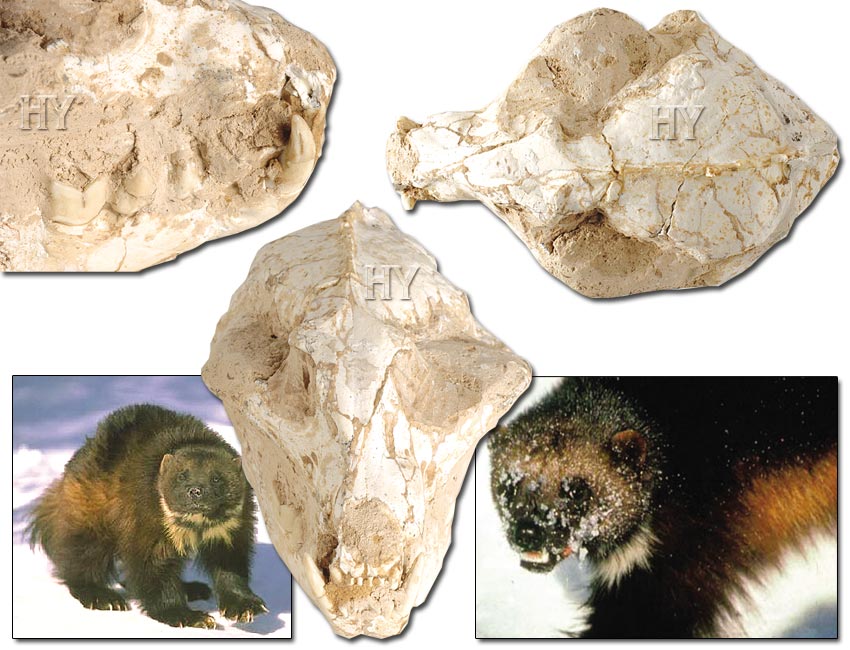 |
Age: 60 million years
Period: Paleocene
Location: Gan Su, China
Evolutionists’ scenarios regarding the origin of mammals are nothing more than stretching of their imaginations. There is not the slightest evidence for any of their claims, and it is scientifically impossible for reptiles to turn into mammals. As revealed by the 60-million-year-old fossil pictured, no mammal with its own unique characteristics came into being from a common ancestor. All mammalian species have survived unchanged throughout their time on Earth.
Tiger Skull
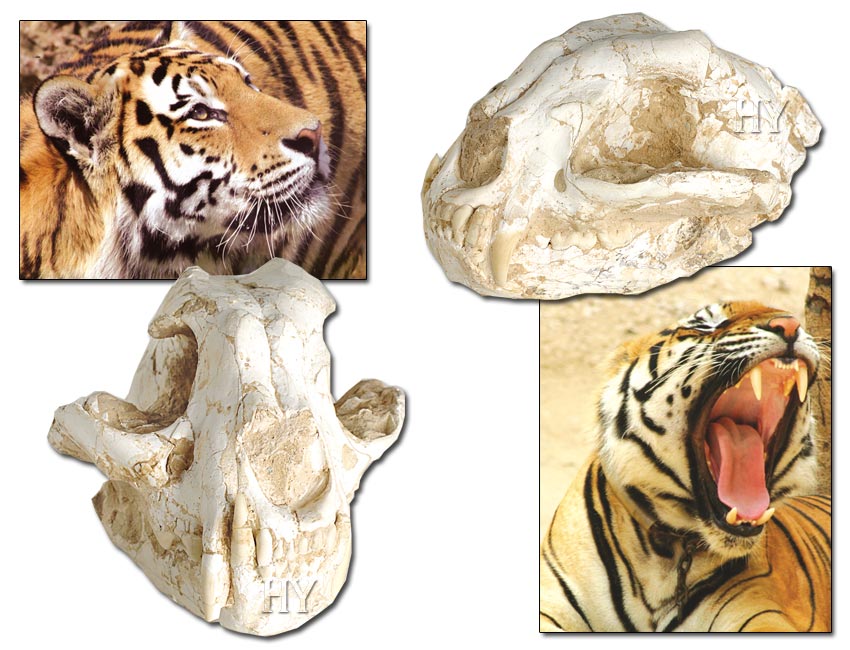 |
Age: 80 million years
Period: Cretaceous
Location:Gan Su, China
In his book Shattering the Myths of Darwinism, the science writer Richard Milton describes how Darwinists, despite all their misleading efforts, lack any scientific evidence to support their theory: "It is impossible for the genuinely objective person to say, 'Here is the conclusive scientific proof that I have been looking for.’" (Richard Milton, Shattering the Myths of Darwinism, p. 14.)
As Milton states, anyone seeking hard evidence for the theory of evolution will return empty-handed. One subject that will cause such a person the greatest disappointment is the fossil record. Research over the last 150 years or so has unearthed not a single specimen to support the theory of evolution. All fossil findings unanimously declare that living things did not evolve, but were created.
Weasel Skull
 |
Age: 23 to 5 million years
Period: Miocene
Location: China
Weasels, members of the family Mustelidae, are another life form that, with their structures that have remained unchanged for millions of years, refutes the claims of evolution.
Like all branches of science, geological research reveals the invalidity of the theory of evolution and demonstrates the fact of Creation. Edmund J. Ambrose, a London University professor of cell biology, notes this state of affairs in these words:
"At the present stage of geological research, we have to admit that there is nothing in the geological records that runs contrary to the view of conservative creationists, that God created each species separately…" (Edmund J. Ambrose, The Nature and Origin of the Biological World, John Wiley & Sons, 1982, p. 164)
Spotted Deer Skull
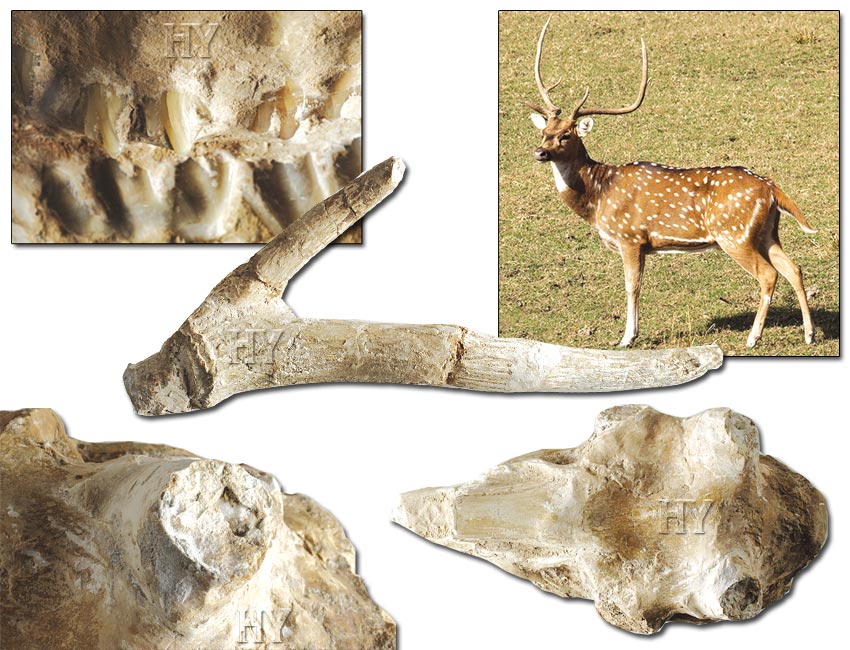 |
Age: 78 million years
Period: Cretaceous
Location: Xin Jiang, China
The idea that all of life is the product of an aimless, coincidental process is 19th -century nonsense. All the concrete findings obtained to date confirm that evolution is nonsense. One such finding is the fossil record itself. The process that only exists in evolutionists’ imaginations has never been supported by fossils.
As can be seen in this 78-million-year-old spotted deer specimen, living things have remained the same over millions of years. This is one of the greatest proofs that evolution never occurred.
Female Binturong Skull
 |
Age: 88 million years
Period: Cretaceous
Location: South Yunnan, China
These creatures, members of the family Viverridae, belong to the class Carnivora. Evolutionists are unable to account for the origins of the binturong, as they are with all other living things. These animals have no supposed forerunner in the fossil record, and there are no fossils to show that they came into being gradually.
As revealed by the 88-million-year-old fossil illustrated here, these animals have had the same features ever since they first came into existence. They have never changed over millions of years—in other words, they have never evolved; they have created.
Boar Skull
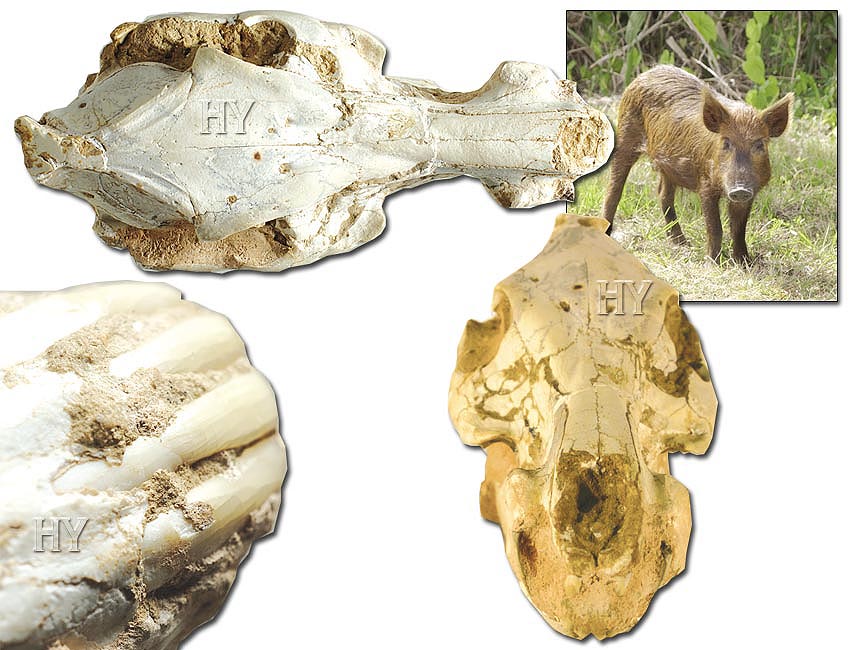 |
Age: 87 million years
Period: Cretaceous
Location: Yunnan, China
There are three known different species of boars, members of the family Suidae. Like all other life forms, boars have always existed as wild pigs and are not descended from any other species. Nor have they ever developed into any "later" one.
Fossil findings prove this. Evolutionist demagoguery and propaganda are worthless in the face of the skull fossil pictured, which shows that wild pigs 88 million years ago had exactly the same features as their counterparts today. Evolutionists may have been able to deceive themselves, but they can no longer mislead rational, logical people by deceit.
Wolverine Skull
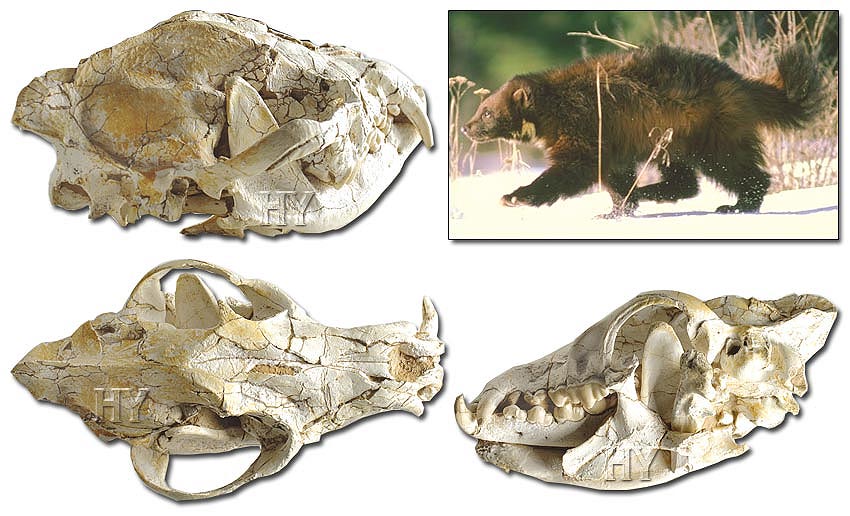 |
Age: 23 to 5 million years
Period: Miocene
Location:China
Darwinists’ 150-year quest for an "intermediate" form fossil has so far proved fruitless. Modern-day evolutionists have no findings they can point to as evidence. The anthropologist Jeffrey H. Schwartz describes how the fossil record works against Darwinism:
"... Instead of filling the gaps in the fossil record with so-called missing links, most paleontologists found themselves facing a situation in which there were only gaps in the fossil record, with no evidence of transformational intermediates between documented fossil species." (Jeffrey H. Schwartz, Sudden Origins, 1999, p. 89)
Antelope Skull
 |
Age: 83 million years
Period: Cretaceous
Location:He Zheng, Gan Su, China
The fossil record deals a lethal blow to Darwinism, but evolutionists constantly seek to ignore this. Instead of talking about their fossil findings, evolutionists prefer to conjure up imaginary scenarios and engage in demagoguery to maintain their own propaganda.
Yet no matter how much evolutionists flee from the facts, millions of fossils like the 83-million-year-old antelope skull pictured proclaim that evolution never happened.
Tibetan Sand Fox Skull
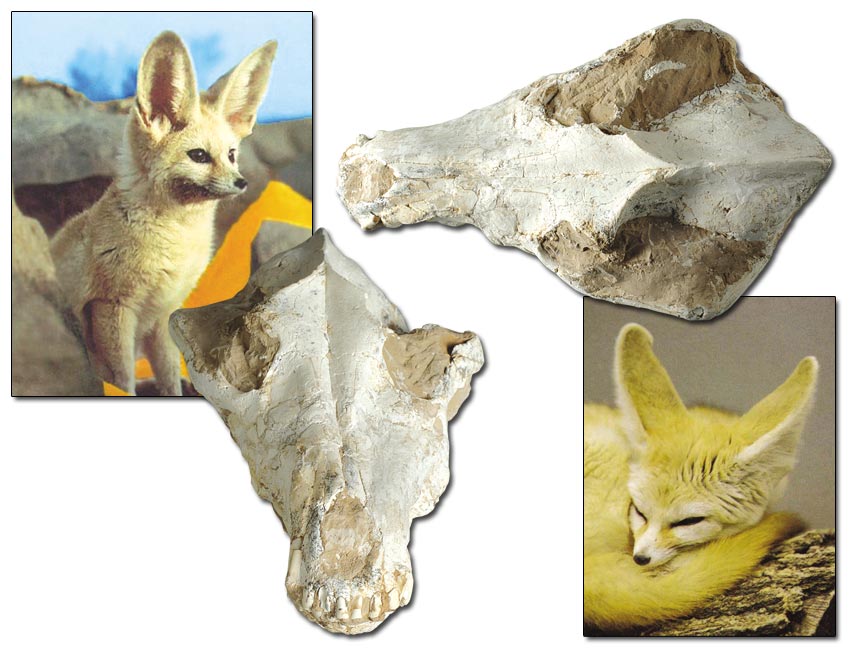 |
Age: 86 million years
Period: Cretaceous
Location:Du Lan County, Qing Hai, China
Tibetan sand foxes, members of the order Carnivora, are also known simply as sand foxes. They generally feed on flightless birds, rabbits and other rodents.
The fossil record proves that sand foxes have always existed as sand foxes and are not descended from any other life form. The 86-million-year-old sand fox skull fossil in the picture, being identical to that of sand foxes living today, is one of the proofs that evolutionists are simply giving tongue to their dreams. No process such as that claimed by Darwinists ever occurred, and evolutionist hypotheses are devoid of any supporting scientific evidence.
Brown Bear Skull
 |
Age: 75 million years
Period: Cretaceous
Location: Liao Yang, Liaoning, China
Statements by George Gaylord Simpson, one of the 20th century’s leading evolutionists, show just howgreat the predicament facing the theory of evolution truly is:
This is true of all thirty-two orders of mammals . . . The earliest and [allegedly ]most primitive known members of every order [of mammals] already have the basic ordinal characters, and in no case is an approximately continuous sequence from one order to another known. In most cases, the break is so sharp and the gap so large that the origin of the order is speculative and much disputed. . . .(George G. Simpson, Tempo and Mode in Evolution, New York: Columbia University Press, 1944, pp. 105, 107.)
As evolutionists admit, Darwinism’s claims regarding the origin of life is no more than speculation. Concrete findings such as the 74-million-year brown bear skull illustrated show that Creation is a manifest reality.
Panda Skull
 |
Age: 96 million years
Period: Cretaceous
Location: Xi Zang, China
Pandas, which feed solely on bamboo shoots, are members of the family Ailuridae. Their homeland is the western regions of China.
Pandas that lived 96 million years ago have all the features of present-day pandas. This fact, proved by fossils and which refute evolution, is plainly obvious for anyone to see. The fact that Darwinists insist on ignoring the evidence changes nothing. Living things did not emerge as the result of any evolutionary process. All things, living or otherwise, are created by God.
Gray Wolf Skull
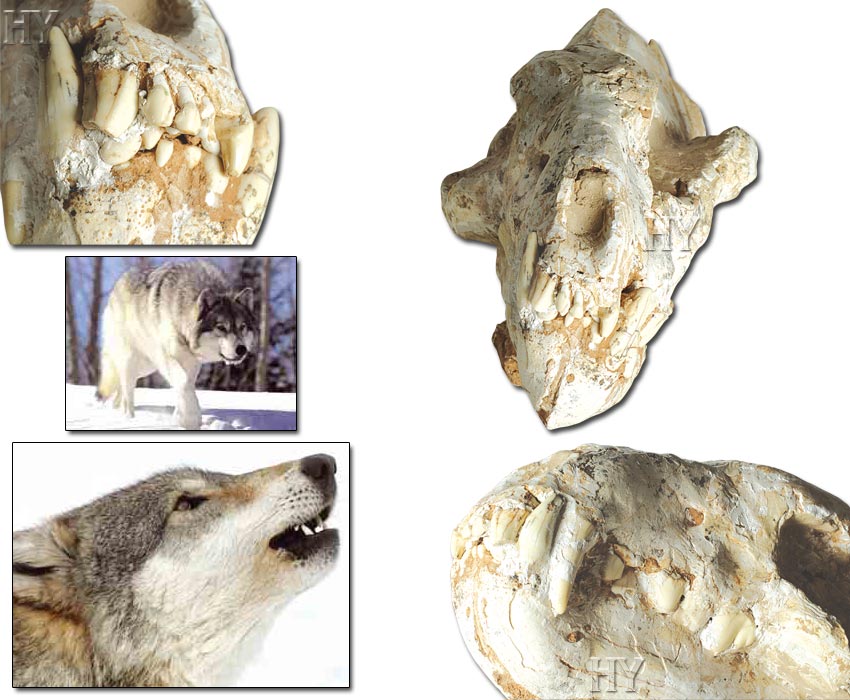 |
Age: 65 million years
Period: Cretaceous
Location: North East Ji Lin, China
One of the findings in the face of the fossil record that make Darwinists despair is the 65-million-year-old gray wolf fossil pictured. Evolutionists are unable to offer a single finding to support the imaginary evolutionary process by which these animals supposedly emerged, even though countless fossils prove that these wolves never evolved, but were created.
Fisher Skull
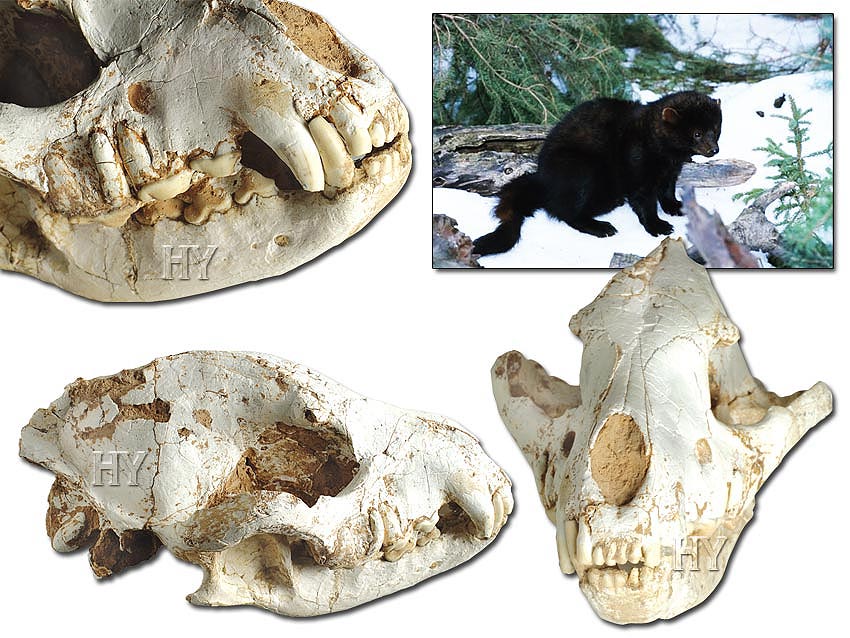 |
Age: 78 million years
Period: Cretaceous
Location:He Zheng, Gan Su, China
There is no difference between fisher s that lived 78 million years ago and those living today. If evolutionists' claims were true, then fishers should have undergone distinct changes over these intervening tens of millions of years and gradually turned into other life forms. Yet such a change never happened. The fact that living things have remained the same for millions of years is a lethal blow to the theory of evolution.
Hyena Skull
 |
Age: 90 million years
Period: Cretaceous
Location: Si Chuan, Gan Su, China
The theory of evolution, for years propped up by false intermediate forms and speculation regarding the fossils of extinct life forms, has now reached the end of its days. Fossils that represent proof of Creation, so carefully concealed by Darwinists, have been placed before the public's gaze. Now, all evolutionists' lies regarding natural history have finally been exposed.
The 90-million-year-old fossilized hyena skull pictured is another such finding. No one who sees how this fossil is identical to specimens alive today can believe in the myth of evolution any longer.
Wolverine Skull
 |
Age: 90 million years
Period: Cretaceous
Location: Zhou Kou Dian, Beijing, China
Many Darwinists have led academic careers, read dozens of books, carried out countless pieces of research, and published many scientific papers. It is astonishing that they are still unable to see the most obvious truths. They are quite unable to understand, for instance, that the "living fossils"—living organisms that have never undergone the slightest change over the course of millions of years—represent a concrete refutation of Darwinism. They cannot bring themselves to admit the absence of any of the supposed "intermediate-form fossils" they need to confirm their theories.
Despite Darwinists’ difficulties in admitting this truth, countless fossils such as the 90-million-year-old skull in the picture all demonstrate that evolution never occurred.
Crocodile
 |
Age: 65 million years
Period: Cretaceous
Location:Shang Dong, China
Darwinists maintain that marine life forms represent the ancestors of reptiles. According to this claim—which is uncorroborated by any scientific finding—fish left stranded without water were one day forced to emerge onto dry land, thus giving rise to reptiles. Yet not one single fossilized half-fish, half-reptile to support this scenario has ever been encountered. Among all the hundreds of thousands of fossils found so far, fish always appear as distinct fish, and reptiles as obvious reptiles. Every fossil discovered is identical to its counterparts alive today, or else belongs to a species that once existed, but has become extinct.
One example is the 65-million-year-old fossil crocodile pictured, a proof that crocodiles have always existed as crocodiles.
Frog
 |
Age: 40 million years
Period: Eocene
Location: Shang Dong, China
The evolutionist scenario claims that fish, which evolved from invertebrates, later turned into amphibians capable of living on dry land. Yet as with all other evolutionary tales, there is no evidence for this scenario. Not a single fossil suggestive of any half-fish, half-amphibian has ever been found. On the contrary, all the fossils unearthed to date prove that fish have always existed as fish, and amphibians as amphibians.
The 40-million-year-old frog fossil pictured proves that frogs have never altered in all that time—in other words, that they never evolved.
Salamander Larva
 |
Age: 290 million years
Period: Permian
Location: Rheinpfalz, Germany
Evolutionists claim that fish are the supposed forerunners of amphibians like the salamander, even though they are completely unable to substantiate those claims.
There are three different types of fish that Darwinists point to as the ancestors of amphibians. One of these is the famous "living fossil," the coelacanth. However, when a living specimen was caught in the Indian Ocean in 1938, it was finally realized that all the evolutionists’ speculations regarding this creature had been invalid.
Another fish group come from the class Rhipidistia which—like the coelacanth—have thick tissue and bones in their fins. On account of these different structures, evolutionists claimed that these appendages developed into feet. The fact is, however, that these structures bear not the slightest resemblance to the fore and hind legs of terrestrial animals.
Evolutionists’ third candidate for the role of amphibian ancestor is the lungfish. In addition to breathing through gills, these fish can also come to the surface and breathe air. However, the structure of these fishes’ lungs again bears no similarity to that of terrestrial life forms. The fish’s skeletal structure is also completely different from that of amphibians.
No matter which species of fish evolutionists may choose to regard as the supposed forebear of amphibians, an enormous number of changes would be needed in order for that fish to be able to transform itself into an amphibian. Therefore, there should be an equally vast number of intermediate forms between the two: There must have been odd-looking creatures with half-formed feet and half-fins, with both half-gills and half-developed lungs, or with semi-developed kidneys etc, numbering in the millions.
However, not a single one has ever been encountered in the fossil record. Among the countless fossils in existence, there are fully formed fish and fully formed amphibians, but no intermediate forms. This is something that evolutionists do admit from time to time, even though it totally refutes their theory.
Crocodile
 |
Age: 65 million years
Period: Cretaceous
Location: China
Darwinists maintain that reptiles are descended from amphibians. Yet just as they cannot corroborate the claim that amphibians have a common forerunner, so are they unable to substantiate the claim that reptiles are descended from amphibians.
Many scientists are well aware of this. For example, Robert L. Carroll, author of the book Problems of the Origins of Reptiles, writes:
"Unfortunately not a single specimen of an appropriate reptilian ancestor is known prior to the appearance of true reptiles. The absence of such ancestral forms leaves many problems of the amphibian-reptilian transition unanswered." (Robert L. Carroll, "Problems of the Origin of Reptiles," Biological Reviews of the Cambridge Philosophical Society, Vol. 44, No. 3, July 1969, p. 393)
The 90-million-year-old crocodile fossil pictured is proof that crocodiles are not descended from any supposed ancestor, but have always existed as crocodiles, remaining unchanged over tens of millions of years.
An Elephant's Front Tooth
 |
Age: 60 million years
Period: Paleocene
Location: Yun Nan, China
The fossil pictured is that of a 60-million-year-old elephant’s tooth. This fossil reveals that elephants living 60 million years ago had the same dental features as those living today, and is one of the findings that refute evolution.
- Introduction
- Evolutionists' Intermediate-Form Dilemma
- Cambrian Fossils and The Creation of Species
- "Missing Link Discovered" Headlines are an Unscientific Deception
- Darwin's Illogical And Unscientific Formula
- Fossil Specimens of Land Animals (1/2)
- Fossil Specimens of Land Animals (2/2)
- Fossil Specimens of Marine Creatures (1/5)
- Fossil Specimens of Marine Creatures (2/5)
- Fossil Specimens of Marine Creatures (3/5)
- Fossil Specimens of Marine Creatures (4/5)
- Fossil Specimens of Marine Creatures (5/5)
- Fosil Specimens of Plants (1/2)
- Fosil Specimens of Plants (2/2)
- Fossil Specimens of Insects (1/2)
- Fossil Specimens of Insects (2/2)
